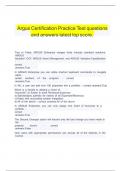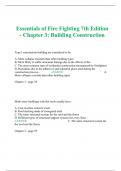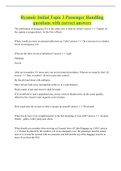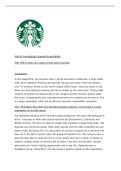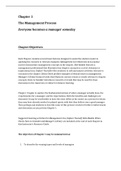Business Strategy and Sustainability
Week 1
Lecture notes
,Know main elements
,Crane, A. & Matten, D. 2006. Business ethics: managing corporate citizenship and
sustainability in the age of globalization (1st ed.). Oxford University Press. [Read only
Chapter 3: pages 75‐95;
Ethical theories are the rules and principles that determine right and wrong for any given situation.
The role of ethical theory
, Ethical absolutism. (traditional) There are eternal, universally applicable moral principles.
According to this view, right and wrong are objective qualities that can be rationally
determined.
Ethical relativism. (contemporary) Claims that morality is context dependent and subjective.
Relativists tend to believe that there are no universal right and wrongs that can be rationally
determined-it simply depends on the person making the decision and the culture in which
they are located. Example: international business issues, where it is argued that since morality
is culturally determined, a moral judgement about behaviour in another culture cannot be
made from outside. Culture depended ethics can be equally right.
Descriptive relativism. suggests that different cultures have different ethics.
Pluralism. This occupies something of a middle ground between absolutism and relativism.
Pluralism accepts different moral convictions and backgrounds while at the same time
suggesting that a consensus on basic principles and rules in a certain social context can, and
should, be reached.
Morality is a social phenomenon. We need morality because we constantly have to establish
the rules and arrangements of our living together as social beings (therefore descriptive
relativism says that morality differs across cultures)
Morality is about harm and benefit. Right and wrong are largely about avoiding harm and
providing benefits. After all, if we didn't dislike harm, or value benefits, there would simply be
no need for morality.
Normative ethical theories: a European perspective (versus US perspective)
• Individual versus institutional morality
America: Individual behaviour
Europe: focus is more on the economic system and the wider governing institution; designing
institutions
• Consequences versus duties
America: Focus on consequences of actions and conceptualize moral status in terms of the
pleasure or the pain of any of these outcome
Europe: duties of the economic actors, since they are generally conceptualized more as parts
of a larger entity and the individual is embedded in wider environment
• Questioning versus accepting capitalism
America: ethical problems occurring within the capitalist system, which it treats as a given
Europe: questioning the ethical justification of capitalism.
• Justifying versus applying moral norm
• movement towards a non-religious form of organizing (especially due to mix and
variety of religions, ideologies ect.)
Week 1
Lecture notes
,Know main elements
,Crane, A. & Matten, D. 2006. Business ethics: managing corporate citizenship and
sustainability in the age of globalization (1st ed.). Oxford University Press. [Read only
Chapter 3: pages 75‐95;
Ethical theories are the rules and principles that determine right and wrong for any given situation.
The role of ethical theory
, Ethical absolutism. (traditional) There are eternal, universally applicable moral principles.
According to this view, right and wrong are objective qualities that can be rationally
determined.
Ethical relativism. (contemporary) Claims that morality is context dependent and subjective.
Relativists tend to believe that there are no universal right and wrongs that can be rationally
determined-it simply depends on the person making the decision and the culture in which
they are located. Example: international business issues, where it is argued that since morality
is culturally determined, a moral judgement about behaviour in another culture cannot be
made from outside. Culture depended ethics can be equally right.
Descriptive relativism. suggests that different cultures have different ethics.
Pluralism. This occupies something of a middle ground between absolutism and relativism.
Pluralism accepts different moral convictions and backgrounds while at the same time
suggesting that a consensus on basic principles and rules in a certain social context can, and
should, be reached.
Morality is a social phenomenon. We need morality because we constantly have to establish
the rules and arrangements of our living together as social beings (therefore descriptive
relativism says that morality differs across cultures)
Morality is about harm and benefit. Right and wrong are largely about avoiding harm and
providing benefits. After all, if we didn't dislike harm, or value benefits, there would simply be
no need for morality.
Normative ethical theories: a European perspective (versus US perspective)
• Individual versus institutional morality
America: Individual behaviour
Europe: focus is more on the economic system and the wider governing institution; designing
institutions
• Consequences versus duties
America: Focus on consequences of actions and conceptualize moral status in terms of the
pleasure or the pain of any of these outcome
Europe: duties of the economic actors, since they are generally conceptualized more as parts
of a larger entity and the individual is embedded in wider environment
• Questioning versus accepting capitalism
America: ethical problems occurring within the capitalist system, which it treats as a given
Europe: questioning the ethical justification of capitalism.
• Justifying versus applying moral norm
• movement towards a non-religious form of organizing (especially due to mix and
variety of religions, ideologies ect.)

